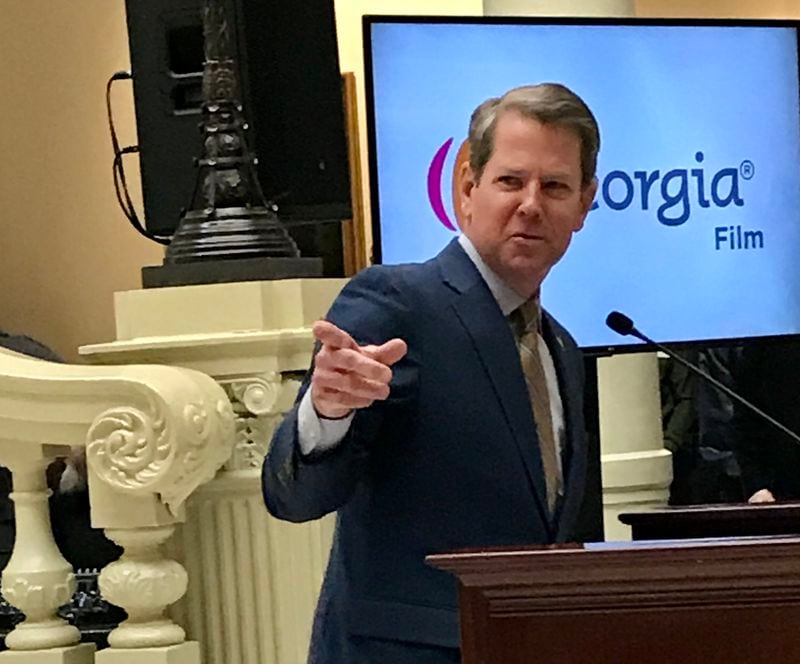The Georgia Production Partnership (GPP) and state Rep. Long Tran (D) are co-hosting a special Georgia Film Day on Monday to remind legislators how important the TV and film business is in the state.
The free event, the first one of its kind in four years, will be held at Atlanta City Hall at 6 p.m. Monday, March 18. Atlanta Mayor André Dickens and film and music producer Dallas Austin are scheduled to attend along with former “Walking Dead” producer Tom Luse and actors Elaine Hendrix (”Dynasty,” “The Parent Trap”) and Ethan Embry (”Sweet Home Alabama,” “That Thing You Do!”).
Registration is required at georgiaproduction.org and there is currently a waiting list.
“We want this to be a pep rally for our community,” said Shellie Schmals, a full-time publicist and volunteer co-president for GPP.
Legislators are currently considering a bill that would make significant changes to the 2008 TV and film tax credit system, which helped spur a massive influx of film and TV shows into the state over the past 16 years. Last year, producers spent $4.1 billion in Georgia for the fiscal year ending June 20, 2023, including scripted TV dramas (”Will Trent,” “The Resident”), streaming films (”Pain Hustlers,” “The Family Plan”) and a sequel or two (”Bad Boys 4″).
Credit: Disney
Credit: Disney
One key aspect about the tax program is that it’s entirely uncapped, meaning there is no technical limit to how many tax credits can be certified in any given fiscal year. Some legislators have expressed concerns about the return on investment for the state’s largest corporate tax break for a single industry. Georgia has certified more than $1 billion a year in tax credits for the past three fiscal years.
The current bill that is being considered in the state Senate would create more hurdles for producers to receive the top 30% tax credit and limit the amount of tax credits transferred any given year to 2.5% of the proposed state budget starting in 2026. With the current budget, that would be just over $920 million a year, less than the amount certified in recent years.
Under the current system, a producer that spent $10 million in the state for a movie would receive $3 million in tax credits. If the company didn’t owe state taxes because it’s based elsewhere, the company could sell the credits to a company or individual with significant tax exposure in Georgia like Home Depot or Coca-Cola.
A revision to the system that requires more stringent audits has slowed the certification process for tax credits, but business was already slower because of the writers and actors strikes last year.
The Georgia Screen Entertainment Coalition, a lobbying group which represents mostly larger studios in town and is an affiliate of the Georgia Chamber of Commerce, has worked behind the scenes to try to ensure the bill won’t greatly deter big companies like NBCUniversal and Disney from coming to the state. It has not actively opposed the bill.
Fellow lobbyist GPP, which helped design the tax credit in 2008 and has 450 members, largely represents independent filmmakers and grassroot creatives. It has also kept quiet about the bill but is lobbying to protect its members’ interests.
Tran, the Georgia House representative who helped make Georgia Film Day happen, said he worries the bill could hurt smaller producers by piling on more paperwork and deterring them from shooting here.
“I understand the concern about not having a cap, but I think we’re in the early days of our film industry in Georgia,” Tran said. “We are still building our infrastructure. We need to give our people a chance to reach that level of creativity.”
The bill, he notes, doesn’t directly penalize producers who are based in Georgia like Tyler Perry and pay taxes here. They would have less need to transfer the credits to somebody else.
Tran said he hopes for a good turnout of legislators from both parties to meet with actors, film producers and crew members at Georgia Film Day. “I think people need to know that even with the possible changes that we support the industry,” Long said.
Craig Miller, an Atlanta independent filmmaker and producer who is government relations chairman for GPP, said he wants to “educate investors on how they can be more involved in making more movies in Georgia. And we want to make sure the whole state is included and branch out to areas in the state where filmmaking is less established.”
Credit: RODNEY HO/rho@ajc.com
Credit: RODNEY HO/rho@ajc.com
Georgia Film Day was a fixture at the Georgia State Capitol in the 2010s, hosted by the Georgia film office. But this year, the film office opted to hold a private invite-only networking event at the Fox Theatre’s Egyptian Ballroom that celebrated the office’s 50 years of existence. It was not open to the public or media. Gov. Brian Kemp and Pat Wilson, commissioner of the Georgia Department of Economic Development, spoke at the event.
Oscar-winning director Francis Ford Coppola (”The Godfather” trilogy), who recently shot his $100 million science fiction drama “Megalopolis” featuring Adam Driver in metro Atlanta, took pictures with attendees.
Kemp was invited to Georgia Film Day but the organizers said he has not yet RSVPed. Kemp’s press secretary Thursday said the event was not on his schedule.







